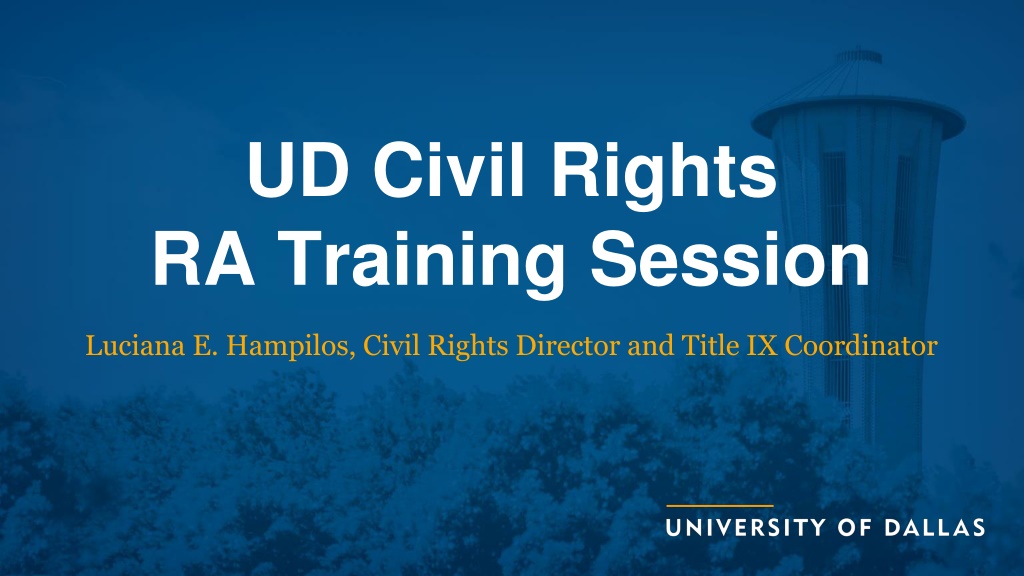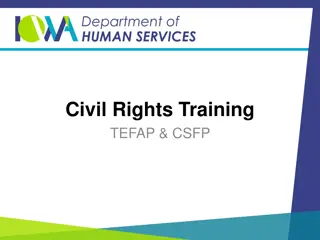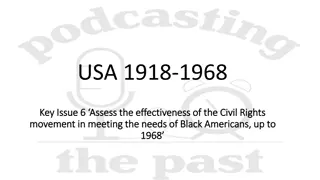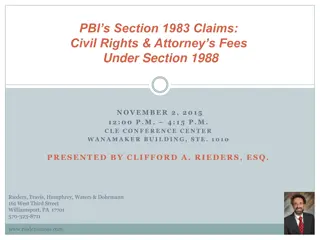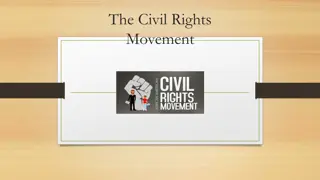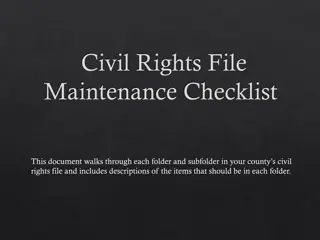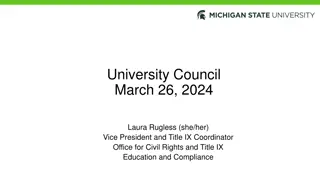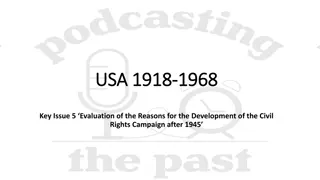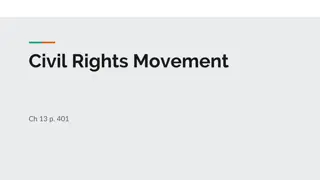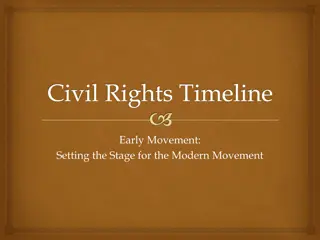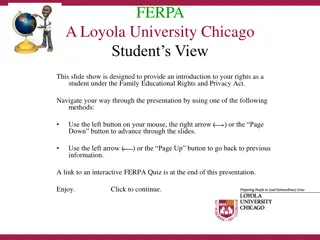University of Delaware Civil Rights Training Session Overview
This overview covers the University of Delaware's Civil Rights policies which prohibit discrimination based on various categories. It includes information on reporting obligations for employees regarding incidents of violation, such as sexual harassment and assault. The content emphasizes the importance of upholding civil rights and outlines the University's stance on discrimination, harassment, and retaliation.
Download Presentation

Please find below an Image/Link to download the presentation.
The content on the website is provided AS IS for your information and personal use only. It may not be sold, licensed, or shared on other websites without obtaining consent from the author. Download presentation by click this link. If you encounter any issues during the download, it is possible that the publisher has removed the file from their server.
E N D
Presentation Transcript
UD Civil Rights RA Training Session Luciana E. Hampilos, Civil Rights Director and Title IX Coordinator
Overview of UDs Civil Rights Policies Catholic Identity Federal & State Laws The University will not discriminate against any Employee, applicant for employment, Student or applicant for admission on the basis of race, ethnicity, national origin, sex, pregnancy, disability, veteran status, age, or religion, or any other protected category under applicable federal, state or local law, except as otherwise permitted by law. The University preserves its authority to exercise religious freedom and to remain faithful to its Catholic mission and Ex corde ecclesiae in those areas that may be inconsistent with this policy Relationship to Other Policies (e.g.,Student and Employee Handbook)
hypothetical Jane is an undergraduate student and a residence assistant in Jerome. While making her rounds through the dorm, she comes upon one of the Jerome residents, Betsy, who is talking to her (Betsy s) friend Kate. Jane stops to visit with Betsy and Kate and to make sure that Betsy is ok. Kate, and then Betsy, tell Jane that Betsy was drinking with some friends and classmates the previous weekend. Betsy had too much to drink, and one of the classmates, Dave, walked Betsy back to her dorm. However, when they got there, Dave went with Betsy into her dorm room. She states that she does not remember much afterwards, as she thinks she either blacked out or fell asleep. Betsy states that she awoke to find Dave engaging in vaginal intercourse with her. She states that she tried to push him away and tell him no. She states that her memory goes black after that, and he was gone when she awoke in the morning.
Reporting Obligations Civil Rights Policy- Protocol for Reporting- 6 All Employees, other than a Confidential Reporter, are required to: promptly report to the appropriate Civil Rights Coordinator any incident the Employee witnesses or receives information about that the Employee reasonably believes constitutes a violation of the University Civil Rights Policy, including, but not limited to, Sexual Harassment, Sexual Assault, Dating Violence, and Stalking. The Employee must report such an incident regardless of when or where the incident occurred. Failure to report may lead to mandatory termination or criminal charges.
Discrimination Discrimination, harassment, or retaliation based on race, ethnicity, national origin, sex (including , sexual harassment, sexual assault, dating violence and stalking), pregnancy, disability, veteran status, age, religion, or any other protected category under law. Harassment means a form of discrimination based on a person s membership or perceived membership in a protected category that includes physical, verbal, or nonverbal conduct. that is sufficiently severe or pervasive, and objectively offensive, such that it unreasonably interferes with, denies, or limits someone s ability to participate in or benefit from the University s educational, employment, social, or residential programs. Retaliation refers to any adverse action taken against a person participating in a protected activity because of that person s participation in that protected activity.
Examples of Sex Discrimination Sexual harassment Sexual assault Dating violence Stalking Consent is knowing, voluntary and clear permission by word or action to engage in mutually agreed upon sexual activity.
Clery Act Reports of Crimes at UD
What types of crimes must be reported pursuant to the Clery Act, including the Violence Against Women Act? Primary crimes, including Criminal homicide: murder and nonnegligent homicide; and negligent manslaughter; Sex offenses: rape; fondling; incest; and statutory rape; Robbery; Aggravated assault; Burglary; Motor vehicle theft; and Arson. Arrests and referrals for disciplinary actions, including Arrests for liquor law violations, drug law violations, and illegal weapons possession; Referrals for campus disciplinary action for liquor law violations, drug law violations, and illegal weapons possession; Hate crimes, including Any of the primary crimes, if they are determined to be hate crimes; and The following crimes, if they are determined to be hate crimes: larceny-theft; simple assault; intimidation; and destruction/damage/vandalism of property; and Dating violence, domestic violence, and stalking.
Training Scenarios Mandatory Reporting
Scenario 1 What type of reporting obligations does Jane have? Jane is an undergraduate student and a residence assistant in Jerome. While making her rounds through the dorm, she comes upon one of the Jerome residents, Betsy, who is talking to her (Betsy s) friend Kate. Jane stops to visit with Betsy and Kate and to make sure that Betsy is ok. Kate, and then Betsy, tell Jane that Betsy was drinking with some friends and classmates the previous weekend. Betsy had too much to drink, and one of the classmates, Dave, walked Betsy back to her dorm. However, when they got there, Dave went with Betsy into her dorm room. She states that she does not remember much afterwards, as she thinks she either blacked out or fell asleep. Betsy states that she awoke to find Dave engaging in vaginal intercourse with her. She states that she tried to push him away and tell him no. She states that her memory goes black after that, and he was gone when she awoke in the morning.
Scenario 1 What type of reporting obligations does Jane have? Jane s first priority is, and should be, trying to put Kate in contact with resources at the University such as the Title IX office, the Counseling Center, the Health Clinic, and/or the University of Dallas Police Department. In addition, Jane has certain reporting obligations that she must fulfill:
Scenario 1 What type of reporting obligations does Jane have? First, Jane must notify the Title IX Coordinator or one of the deputy Title IX Coordinators about the incident. Jane must provide the Coordinator with all the relevant information that Jane knows. That would include the type of incident (rape), the location of the incident (Jerome Hall), the date or approximate date the incident occurred (the previous weekend), the names of the individuals with possible information (Betsy, Kate, Dave), and all information that Jane knows about the incident. However, Jane is not required (and generally should not) ask detailed questions of Betsy or Kate nor attempt to investigate the incident.
Scenario 1 What type of reporting obligations does Jane have? Second, Jane must notify the University of Dallas Police Department that she, as a campus security authority, received information about a Clery-reportable incident on campus. Jane will need to tell UDPD the type of incident (rape), the location of the incident (Jerome Hall), and the date or approximate date the incident occurred (the previous weekend). Jane does not need to tell UDPD the identity of Betsy, Kate, or Dave. It is up to Betsy to decide whether she wants to report the incident to the police. Jane s obligation is to provide basic information to UDPD for documenting in the University s crime log and in its crime statistics. Again, Jane is not required (and generally should not) ask detailed questions of Betsy or Kate nor attempt to investigate the incident.
Scenario 1 What type of reporting obligations does Jane have? Jane must notify the Office of Civil Rights and Title IX and the University of Dallas Police Department of this incident, regardless of whether she has also reported the incident to the Office of Student Affairs.
Scenario 2 What type of reporting obligations does Sarah have? Sarah is an undergraduate student and a residence assistant in Clark Hall. One day while Sarah is hanging out with her long-time friend Clare, Clare tells Sarah that, during their freshman year at UD, Clare had an especially bad experience with a male classmate she briefly dated. Clare tells Sarah that she and the classmate, John, were kissing in the lounge area of Madonna Hall when he moved his hand underneath her shirt and started massaging her breast. Clare tells Sarah that she did not feel comfortable with what John did, did not want him to touch her breasts, and froze when the incident occurred. Clare further states that, once she recovered from her shock, she told John that she did not like what he had done and did not want him to do it again. However, Clare states that, the next night, when they were again kissing, John again reached under her shirt and massaged her breast without her consent. Clare tells Sarah that this is the first time she has ever told anyone about the incident and does not want anyone else to know.
Scenario 2 What type of reporting obligations does Sarah have? Despite Clare s request that Sarah not tell anyone about the incident, Sarah has an obligation to report the incident.
Scenario 2 What type of reporting obligations does Sarah have? First, Sarah must notify the Title IX Coordinator or one of the deputy Title IX Coordinators about the incident. Sarah must provide the Coordinator with all the relevant information that Sarah knows. That would include the type of incident (fondling), the location of the incident (Madonna Hall), the date or approximate date the incident occurred (the academic year), the names of the individuals with possible information (Clare and John), and all information that Sarah knows about the incident. Sarah should also tell the Coordinator that Clare did not want the information disclosed. Sarah is not required, however, (and generally should not) ask detailed questions of Clare nor attempt to investigate the incident.
Scenario 2 What type of reporting obligations does Sarah have? Second, Sarah must notify the University of Dallas Police Department that she, as a campus security authority, received information about a Clery-reportable incident on campus. Sarah will need to tell UDPD the type of incident (fondling), the location of the incident (Madonna Hall), and the date or approximate date the incident occurred (the academic year). Sarah does not need to tell UDPD the identity of Clare or John. It is up to Clare to decide whether she wants to report the incident to the police. Sarah s obligation is to provide basic information to UDPD for documenting in the University s crime log and in its crime statistics. Again, Sarah is not required (and generally should not) ask detailed questions of Clare nor attempt to investigate the incident.
Scenario 2 What type of reporting obligations does Sarah have? Sarah must notify the Office of Civil Rights and Title IX and the University of Dallas Police Department of this incident, regardless of whether she has also reported the incident to the Office of Student Affairs.
Scenario 3 What type of reporting obligations do Jim and Kim have? Jim is an undergraduate student and also works as a student-worker in the library. Jim comes to work one day looking very upset. His supervisor, Kim, asks him how his day is going. Jim states that he is very upset because of an interaction he had with one of his professors earlier that day. He states that he went to speak to one of his professors about a low grade he received on the midterm. During their discussion about the midterm, the professor said something about Jim having had extra time to complete the midterm and was graded accordingly. Jim receives extra time on exams as a disability accommodation that has been approved by Student Disability Services. Jim believes that the professor penalized Jim s grade for having used the extra time he was authorized to receive as a disability accommodation.
Scenario 3 What type of reporting obligations does Jim have? The University hopes that Jim will report the incident to the Office of Civil Rights and Title IX. However, Jim does not have any reporting obligations. Jim appears to believe that he experienced disability discrimination, which is a violation of the University s Civil Rights Policy. Generally, all employees, including student-workers, are required to report violations of the University s Civil Rights Policy. The Policy does not require University employees to report an incident where it is the employee who allegedly suffered the violation.
Scenario 3 What type of reporting obligations does Kim have? While Jim does not have any reporting obligations, Kim does. Kim is an employee of the University and is not the person who allegedly experienced the violation of the Civil Rights Policy. Consequently, Kim must notify the Civil Rights Coordinator or one of the deputy Civil Rights Coordinators about the incident. Kim must provide the Coordinator with all the relevant information that Kim knows. Kim is not required, however, (and generally should not) ask detailed questions of Jim nor attempt to investigate the incident. Kim does not have to report the incident to the University of Dallas Police Department because the incident does not constitute a crime under the Clery Act.
Supportive Measures
Supportive Measures May include changes in academic, living, transportation, working conditions, or other protective measures. Designed to facilitate equal opportunity to participate in the University. No formal complaint necessary.
The Formal Complaint
Overview of UDs Civil Rights Process Reports, Formal Complaints, and Informal Resolution
Questions? lhampilos@udallas.edu Deputy Title IX Coordinators: LaCoya Williams, lwilliams2@udallas.edu Monica Heckman, mheckman@udallas.edu
